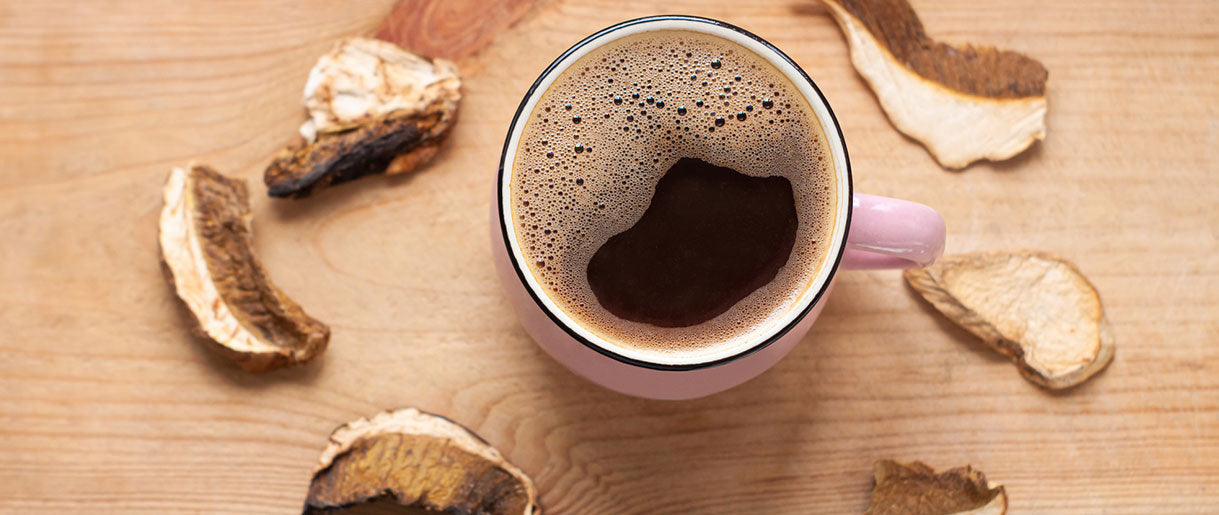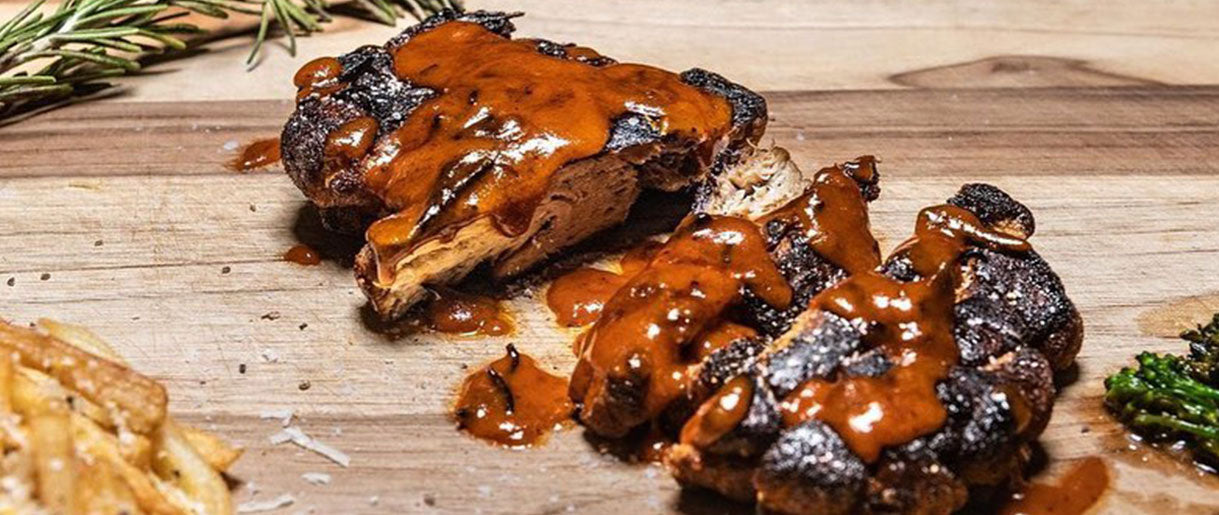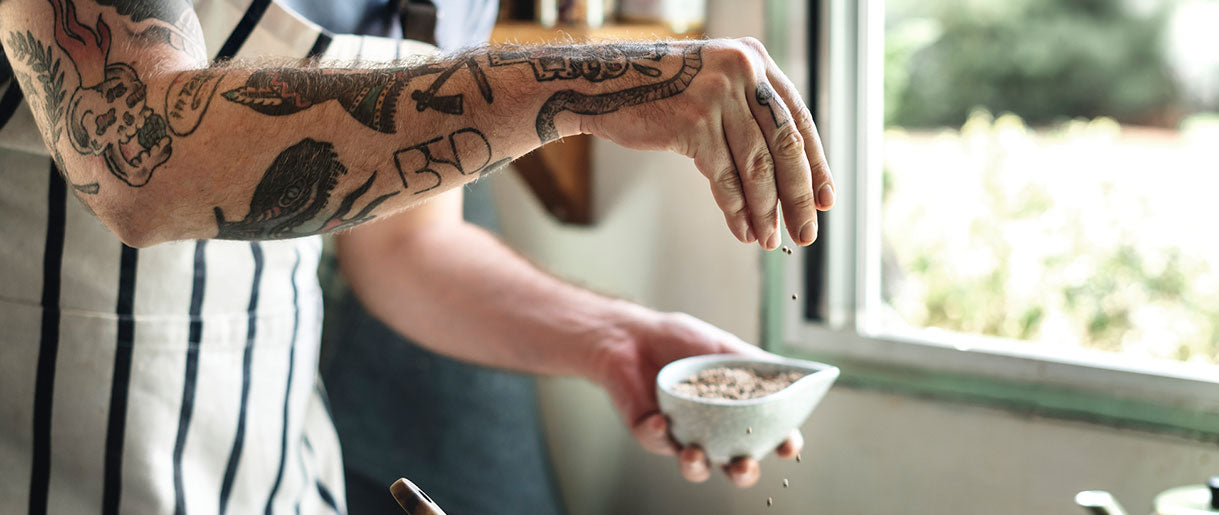You may get your daily caffeine fix from various coffee drinks, including Turkish coffee, americano, espresso, and cappuccino. But there's also a twist to your regular coffee: mushroom coffee. In addition to caffeine, mushroom coffee has various nutrient that boosts immune and cognitive functioning, energy levels, and overall well-being.
Mushroom coffee is being hailed as a healthier alternative to ordinary coffee. However, there are some concerns: does mushroom coffee have caffeine? Or rather: how much caffeine in mushroom coffee?
Mushroom coffee is made using a variety of functional mushrooms, so the amount of caffeine in them can vary. Generally, mushrooms, such as Chaga, do not have caffeine, lowering the caffeine content in your cup of mushroom coffee. The caffeine content varies between the mushrooms used and the brand but typically ranges from 0 to 50 mg.
Let’s explore the mushroom coffee caffeine content and how it’s different from your regular coffee.
Mushroom Coffee Vs. Regular Coffee: What’s The Deal?
Mushroom coffee is not made from mushrooms. Nor does it have mushrooms floating on top of the cup (well, that would be weird!)
A cup of mushroom coffee is made by blending ground mushrooms and coffee beans (the same coffee you know and love) to create a dark, smooth, nutty coffee. Alternatively, add a scoop of your favorite mushroom powder to a cup of coffee.
These mushrooms are not your typical white button, shiitake, portobello, or the magical variety. Instead, medicinal mushroom extracts are typically used in mushroom coffee.
What Are The Mushrooms Used In Mushroom Coffee?

This trendy coffee is made with functional mushrooms such as Chaga, Lion's mane, Turkey tail, Cordyceps, and Reishi.
Chaga(1) is rich in antioxidant and anti-inflammatory properties, which help boost the immune system, lower blood sugar levels, and inflammation, and improve insulin resistance.
Cordyceps(2) provides anti-inflammatory properties and antioxidant support in traditional Chinese and Tibetan herbal remedies. In addition, it aids in treating illnesses like liver problems, respiratory disorders, high cholesterol, arrhythmias, and even male sexual issues.
Reishi mushroom improves sleep, lowers blood pressure and cholesterol levels, strengthens the immune system, improves blood flow, boosts progesterone and estrogen production, and lessens fatigue(3).
Lion's mane(4) improves digestion, reduces the risk of heart disease, protects against cognitive decline (including Alzheimer's, dementia, and other conditions), relieves anxiety and depressive symptoms, and a quicker recovery from nervous system injuries.
Now, we know not all functional mushroom species are linked to energy support; some species, for instance, have been used to reduce stress. But if you drink coffee for energy support, your first question is, do mushrooms have caffeine?
Is There Caffeine In Mushroom Coffee?

The amount of caffeine in various mushroom coffee brands and blends varies. Typically, mushroom coffee has half the amount of caffeine as ordinary coffee since mushrooms are devoid of caffeine.
This is good news for those sensitive to caffeine and may help you sleep better. It also helps avoid energy crashes and jitteriness brought on by too much of the stimulant.
A regular 8-oz cup of coffee typically has 80–100 mg of caffeine, while other coffee beverages contain substantially more —like lattes or espressos, which usually have 126 mg of caffeine in each shot. Tea, chocolate, soft drinks, energy drinks, pain relievers, and tea all contain caffeine. Depending on the brand, mushroom coffee might have between 0 and 50 mg of caffeine.
But for those who want their caffeine fix, you must now think: why do we mix caffeine and mushrooms? Let’s find out the health benefits of drinking mushroom coffee next!
Health Benefits Of Mushroom Coffee

Mushrooms and coffee go together like mozzarella and tomato sauce. So, combining these two is going to add the health benefits of coffee and functional mushrooms—a win-win situation for everyone.
The typical flavor, aroma, and efficiency of a standard cup of coffee are all present in mushroom coffee. In addition, the qualities of the milled and dried mushroom extracts fill in and add more fiber and nutrients.
Coffee itself offers several potential benefits. Understandably, most individuals consume coffee as its caffeine can make them feel more energized and less weary. This organic stimulant stimulates norepinephrine and dopamine while blocking the inhibitory neurotransmitter adenosine, which enhances the firing of neurons and causes a momentary euphoria. According to numerous controlled research, coffee is associated with better memory, energy levels, mood, reaction speeds, and mental functioning.
Depending on the variety of mushrooms used, proteins and nutrients may not be present in a typical cup of coffee. But, in a nutshell, here are the benefits of mushroom coffee:
- Improves vitality.
- Provides immune support.
- Natural source of energy.
- Enhances stamina and endurance.
- Support overall health and wellness.
- Provides nutrition.
- Stimulates brain health and cognition.
- Encourages lymphatic, cellular, and systemic functional support.
What Does Mushrooms Coffee Taste Like?

Mushroom coffee is similar to regular coffee in flavor. Several people have said mushroom coffee has a faint earthy or nutty flavor. Still, many mushroom species have relatively mild flavors that don't overtake the flavor of coffee beans.
Mushroom Coffee Customizing Tips
With mushroom powders, you can adjust your caffeine intake in the following ways:
- You can make any cup of coffee with the 2 grams of single-species mushroom powder recommended for daily consumption.
- Reduce your caffeine consumption by adding mushroom powders to decaf coffee.
- Add an espresso shot to your mushroom coffee blend to up your caffeine intake.
In addition to coffee, there is a range of other methods to make use of the advantages of functional mushrooms, such as adding blended mushroom or single-species powder to teas, smoothies, and recipes.
How Much Mushroom Coffee Is Ok?

For most people, the FDA has determined that 400 milligrams of caffeine per day is a generally safe level of intake that is not linked to any adverse health impacts. Therefore, three cups of mushroom coffee daily will be slightly less than the FDA's recommendation, depending on the brand or blend.
It’s vital to realize that caffeine is a stimulant. The FDA’s safe level of consumption recommendation may vary for children and adolescents, pregnant or nursing mothers, and people taking certain types of medications. The best action is to speak with your doctor about any concerns.
FAQs About Does Mushroom Coffee Have Caffeine
Who Should Not Drink Mushroom Coffee?
Some fungal spices in mushroom coffee may lower your blood sugar levels and interact with your medications if you have type 2 diabetes or any blood-related conditions. Preferably, people with heart conditions should exercise caution as well.
Does Mushroom Coffee Have Any Side Effects?
Mushroom coffee might cause various health issues if consumed in excess. For example, Chaga is high in oxalates and can raise the risk of kidney stone formation, while Cordyceps may cause moderate side effects, including diarrhea, constipation, and stomach discomfort. Other reported adverse effects include rashes, headaches, dizziness, nausea, stomach issues, itching, and dry mouth with Lion's mane and Reishi.
Is Mushroom Coffee Safe To Drink If You Are Pregnant?
Pregnant ladies haven't yet reported any complaints or complaints after having consumed mushroom coffee, but the effects of mushroom coffee on expectant mothers haven't been thoroughly established yet. However, speak with your doctor before making any dietary changes while pregnant to reduce the risk of complications.
Key Takeaway
Does mushroom coffee have caffeine? Yes, it does. However, it’s lower than your average cup. So, pour yourself a steaming mug and enjoy the goodness of coffee and mushrooms.
References
- Review on Chaga Medicinal Mushroom, Inonotus obliquus (Higher Basidiomycetes): Realm of Medicinal Applications and Approaches on Estimating its Resource Potential, (1)https://pubmed.ncbi.nlm.nih.gov/25746615/
- Cordyceps spp.: A Review on Its Immune-Stimulatory and Other Biological Potentials, (2)https://pubmed.ncbi.nlm.nih.gov/33628175/
- Ganoderma lucidum (Reishi) an edible mushroom; a comprehensive and critical review of its nutritional, cosmeceutical, mycochemical, pharmacological, clinical, and toxicological properties, (3)https://pubmed.ncbi.nlm.nih.gov/34411377/
- Lion's Mane Medicinal Mushroom, Hericium erinaceus (Agaricomycetes), Modulates Purinoceptor-Coupled Calcium Signaling and Murine Nociceptive Behavior, (4)https://pubmed.ncbi.nlm.nih.gov/29199560/









Let Us Know Your Comments